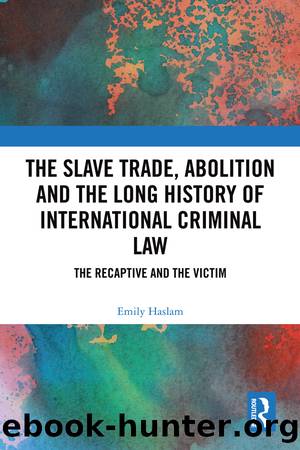The Slave Trade, Abolition and the Long History of International Criminal Law by Emily Haslam

Author:Emily Haslam [Haslam, Emily]
Language: eng
Format: epub
Tags: History, Military, Naval, Americas (North; Central; South; West Indies), Law, General, Civil Rights, Criminal Law, International, Legal History
ISBN: 9780429791093
Google: NdCwDwAAQBAJ
Publisher: Routledge
Published: 2019-09-20T01:37:26+00:00
The expansion of intervention
British Commissioners at Sierra Leone, frequently sitting alone, interpreted slave trade repression treaties inventively and, as a result, expanded the circumstances in which captors could intervene against slave ships under the relevant treaties. However, it was far easier within the framework of international slave trade repression law for Mixed Commissioners to expand the rights of captors in circumstances where captures breached the relevant treaties than they were able in similarly situated circumstances to expand the conditions for recaptivesâ formal emancipation.
The purpose of Mixed Commissions was to adjudicate the legality of detention, but slave trade repression treaties only permitted the detention of slave ships in limited circumstances. Mixed Commissions, therefore, were regularly faced with slave ships that had been detained in breach of the relevant international instruments. The adjudication of such unlawfully captured ships was significant for both captors and recaptives. For one thing, captors were liable to pay compensation for unlawful seizures, although the government underwrote claims. For another, slave trade repression treaties, strictly speaking, required that recaptives found on illegally captured ships were returned to slave owners.
Preconditions for lawful detentions were set out in the applicable slave trade repression treaties and related instructions. Slave trade repression treaties bound only those states that had signed them. The fact that a ship was unlawfully slave trading was not enough to condemn it. Nor was it sufficient that there were more slaves on board than the passport allowed (Haslam 2016: 430). Particularly noteworthy was the geographically restricted scope of the right to detain slave ships (ibid.). This limit proved critical in a series of key cases â the Sinceridade, the Activo, the Perpetuo Defensor and finally the Maria da Gloria with which this book opened.
The Additional Convention (Portugal) permitted the Portuguese slave trade in particular locations south of the equator (Article 2). Portugal only agreed to the detention of slave ships north of the Equator (Article 4 Portuguese Instructions). It followed that a Portuguese ship that had been unlawfully slave trading north of the equator could not be detained south of it; claimants of ships detained north of the equator had to show they were trading lawfully (Castlereagh to HM Commissioners at Sierra Leone 20 February 1819: 22; Haslam 2016: 430). At the beginning, the detention of Spanish slave ships was also limited. Until the total abolition of the Spanish slave trade, the British-Spanish Mixed Commission could only condemn ships captured north of the equator (Article 2 Spanish Instructions; Haslam 2016: 430).5 Another significant limitation to detention was that at least initially, captors were only empowered to detain a ship when it had slaves on board, a restriction which was loosened over the lives of Mixed Commissions.
Mixed Commissioners typically responded in one of three ways when ships captured in violation of the treaties came before them. Sometimes they discounted the violation as so trivial that it did not invalidate detention. On other occasions, they creatively and controversially expanded captorsâ rights to intervene. Finally, they ordered restoration, with a question mark over the extent of damages, but with potentially devastating consequences for recaptives.
Download
This site does not store any files on its server. We only index and link to content provided by other sites. Please contact the content providers to delete copyright contents if any and email us, we'll remove relevant links or contents immediately.
| Civil Rights | Discrimination |
| General | Human Rights |
Day by Elie Wiesel(2786)
The Age of Genius by A. C. Grayling(2592)
Gideon's Spies: The Secret History of the Mossad by Gordon Thomas(2355)
The Gulag Archipelago (Vintage Classics) by Aleksandr Solzhenitsyn(2106)
FATWA: Hunted in America by Pamela Geller(2013)
Columbine by Dave Cullen(1870)
Men Explain Things to Me by Rebecca Solnit(1729)
The Rule of Law by Bingham Tom(1701)
Anatomy of Injustice by Raymond Bonner(1671)
Examples & Explanations: Administrative Law by William F. Funk & Richard H. Seamon(1647)
Three Cups of Tea by Greg Mortenson(1620)
The Source by James A. Michener(1618)
That Every Man Be Armed by Stephen P. Halbrook(1583)
ADHD on Trial by Michael Gordon(1581)
Future Design by Unknown(1580)
Gideon's Spies by Gordon Thomas(1512)
Palestinian Walks by Raja Shehadeh(1499)
Constitutional Theory by Carl Schmitt(1458)
Nothing to Envy by Barbara Demick(1451)
